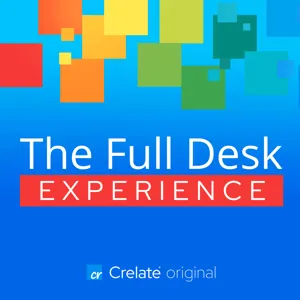Retiring at 65: Is it an outdated idea?
Host Zannat Reza discusses retirement and its implications for our aging population. With over 37% of Canadians aged 50 and over claiming they can't afford to retire, is the notion of retiring at 65 outdated?
Zannat Reza talks with Lisa Taylor, author of The Talent Revolution and president of Challenge Factory, about the new era of work and aging. With our aging population and people living longer, traditional notions of retirement are quickly becoming outdated. Zannat and Lisa discuss the drivers of the future of work and how we can better use our years of expertise. They also address ageism in the workplace. They explain how ageism can cause employees to feel undervalued and unsupported, leading to a lack of engagement and productivity.
Lisa & Zannat offer advice for both employers and employees, highlighting the importance of recognizing and addressing ageism in the workplace. They also discuss the benefits of creating a workforce that values diversity in all its forms, including age diversity. Lisa also provides practical tips for organizations looking to engage and retain their older workers,
Join the conversation about the future of work and aging.
Chapter Time Stamps:
(00:00:00) Episode Introduction
What are your plans when you're 65? Retirement has been ingrained in our culture, but according to a recent National Institute on Aging survey, 37% of Canadians aged 50 and older say they can't afford to retire. In this episode, we explore the idea of retiring at 65 and whether it's still relevant.
(00:01:21) Is retirement at 65 outdated?
Retirement at 65 was chosen as an arbitrary number in the 1930s when life expectancy was only 62. Lisa argues that retiring at 65 is an outdated idea and suggests that we should better use the extra 20-30 years we now have due to increased life expectancy.
(00:03:15) Demographics and Career Ownership
Lisa talks about the changing demographics and aging of the workforce, which she believes will shape the future of work more than technology. She says that as we get older and live longer, we still want to remain engaged and productive, which could include paid work, volunteering, being on boards, or starting a business.
(00:04:19) Ageism in the workplace
Lisa notes that ageism is rampant and socially accepted in the workplace, and women are more affected than men due to sexism. She explains that ageism can lead to barriers for older workers, including being left out of interesting projects or being passed over for promotions. Many organizations start giving cues that employees are ready to retire around age 50, leading to a decline in career conversations and opportunities.
(00:08:17) The Broken Talent Escalator
How an organization treats older workers can also impact younger employees. Taylor explains the concept of a "broken talent escalator." She says that the escalator is like an individual's career path, where they get on the escalator and start to ride up to their desired career level. However, as they approach a certain level, they start to notice that the escalator is ending and there's no option to continue. As a result, the newest employees, who have the least time on the escalator, see older workers riding treadmills and decide not to work for an organization with a culture of older workers on a treadmill.
(00:10:30) Importance of Age Diversity
Taylor discusses the importance of succession planning as the workforce gets older and people start leaving. Taylor suggests that organizations can take immediate action by recognizing age diversity in their diversity, equity, and inclusion efforts.
(00:11:50) Finding a Good Fit
Taylor advises people who face ageism in the workplace to find organizations that value and recognize the hidden talent pool of older workers. She recommends looking for organizations that have diversity of all kinds, including age diversity.
(00:12:40) Engaging Older Workers
Taylor shares creative ways organizations can engage their older workers, including off-ramping strategies where older workers can work part-time or take on a mentorship role. This can be a win-win for both the organization and the older worker.
(0:16:33) - Future of Aging: The Final 2 Questions
Lisa answers the final 2 future of aging questions we ask all our guests.
- (00:00) - Episode Introduction
- (01:21) - Is retirement at 65 outdated?
- (03:15) - Demographics and Career Ownership
- (04:19) - Ageism in the workplace
- (08:17) - The Broken Talent Escalator
- (10:30) - Importance of Age Diversity
- (11:50) - Finding a Good Fit
- (12:40) - Engaging Older Workers
- (16:33) - Future of Aging: The Final 2 Questions















